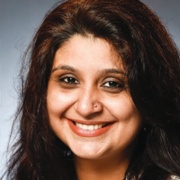Our world is going through profound changes that are driven, in part, by shifting demographics, digitization, and automation. These changes bring great challenges, but they also create opportunities to find solutions that are not problem-centric but rather people-centric; that is, making communities' sense of well-being the prime objective.
As a global community of science professionals, AMS can help build healthy, resilient, and sustainable communities for all by focusing on three areas.
Embedding science into local communities. Communities around the world need data and science to address their everyday needs. AMS should strengthen the capacity of local communities to make science-based decisions. One way to do this is to revitalize AMS local chapters, cultivate new precollege chapters, and strengthen local chapters’ collaboration with our universities’ extension services.
Preparing the scientific community for the future of work. Communities are made of people who want to feel a sense of belonging and purpose. In collaboration with public-private-academic sectors, AMS must prepare our scientific workforce and workplace for the future of work. AMS is already facilitating community discussions to improve the culture of our science. It should also improve the integration of knowledge, methods, and expertise from different disciplines to prepare people to do purposeful work.
Reimagining community engagement. Meetings foster a sense of community well-being and belonging by bringing people around a shared purpose. The transition of meetings to remote or hybrid formats can improve access to, participation in, and engagement with science. AMS must collaborate with other scientific and professional societies, both national and international, to improve the efficiency, usability, and culture of our scientific meetings and conferences.
Respectful and meaningful engagement with any community is like a savings fund — the value adds up over time and acts as a cushion in times of personal, social, or spiritual distress. All my work is inspired by this idea. It would be an honor to bring my perspectives into the work of the AMS Council.
Mona Behl is the associate director of Georgia Sea Grant. In her current role, she provides administrative and financial leadership to Sea Grant, directs its research and fellowship portfolios, builds partnerships, and ensures the quality, relevance, and impact of Sea Grant activities in Georgia.
Behl also holds public service and academic appointments at the University of Georgia and is a nonresident fellow with the AMS Policy Program. All her applied research, education, and extension projects focus on building the adaptive capacity of local communities to impacts of extreme weather and climate change; preparing people for the future of work; and broadening participation in science. Her work is supported by the National Science Foundation, National Oceanic and Atmospheric Administration, and National Aeronautics and Space Administration.
Behl is passionate about improving access, engagement, and leadership development of women and minorities in science. She serves on the leadership board of Earth Science Women’s Network, is a member of the AMS Culture and Inclusion Cabinet, and was recently selected to cochair the Mentoring Physical Oceanography Women to Increase Retention program. Behl is the founding member of the AMS Early Career Leadership Academy and Sea Grant’s Community Engaged Internship program. She is also the former chair of AMS Board on Women and Minorities (now the Board on Representation, Accessibility, Inclusion, and Diversity).
Behl earned her B.Sc. and M.Sc. in physics (Honors School) from Panjab University (India), and her Ph.D. in physical oceanography from Florida State University.
